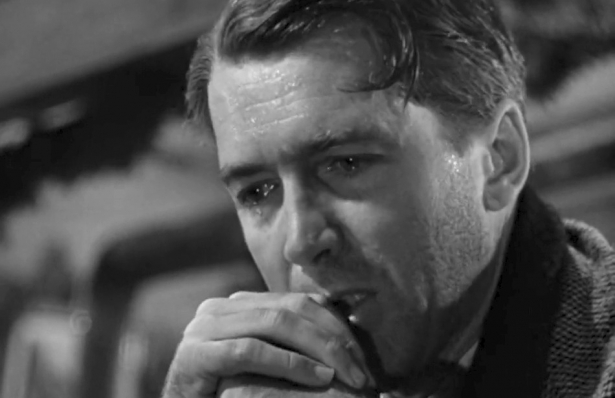Posts Tagged ‘Auld Lang Syne’
If you haven’t ever seen It’s a Wonderful Life, or even if you have seen it, but don’t remember it well, do yourself a favour and go watch it. It is one of those somewhat rare classic films which still holds up amazingly well today. More than that, it isn’t at all the sappy, corny movie that most people assume it is or mis-remember it as.
Far from the cinematic snow-globe that most people mis-categorize it as, It’s a Wonderful Life is surprisingly dark, very witty, and truly entertaining.
Whether they’ve seen it or not, most know it for Jimmy Stewart as George Bailey running through Bedford Falls, yelling “Merry Christmas!”; and of course for the sacharine-sweet Zuzu proclaiming “Teacher says, every time a bell rings, an angel gets his wings!”; all culminating with the tearful reprise of Auld Lang Syne. Those are the images that everybody –everybody who doesn’t remember the film well– recalls immediately upon hearing its name. And I’d agree, if those scenes were indicative of the overall tone of the movie, it would indeed be a sappy mess, hardly worth watching, save for when you desperately need a simple and sweet bit of holiday fluff.
But that is not the feel of the movie! Far from the cinematic snow-globe that most mis-categorize it as, It’s a Wonderful Life is surprisingly dark, very witty, and truly entertaining. The film is thoroughly rewarding even to more refined modern-day audiences. And while it has been elevated to Christmas canon, very little of it actually occurs around Christmastime, and it certainly isn’t your standard holiday fare.
The first two hours of the film are a long, dark study in the psychological torture of George Bailey.
The reason for the dissonance between the perception and the reality of the film is obvious; for decades television network and advertising executives have slavishly adhered to the Law of Classic Films, the law mandating that all, and only, the most clichéd moments of classic films must be repeated, ad nauseum, in every advertisement or reference to said films.
What makes It’s a Wonderful Life such a surprise to the first-time viewer is that, while its runtime is a hearty 130 minutes, all of those oft-remembered, oft-rehashed, and awfully sweet moments occur in the final 7 minutes of the film. While the final few minutes are indeed a super-concentrated distillation of the essence of Christmas, they serve as a well-balanced counterpoint, a satisfying glaze, too sweet on its own, but just perfect as the topper to the body of the film. These clichéd, over-sweet moments work so beautifully well, because the first two hours of the film are a long, dark study in the psychological torture of George Bailey.





